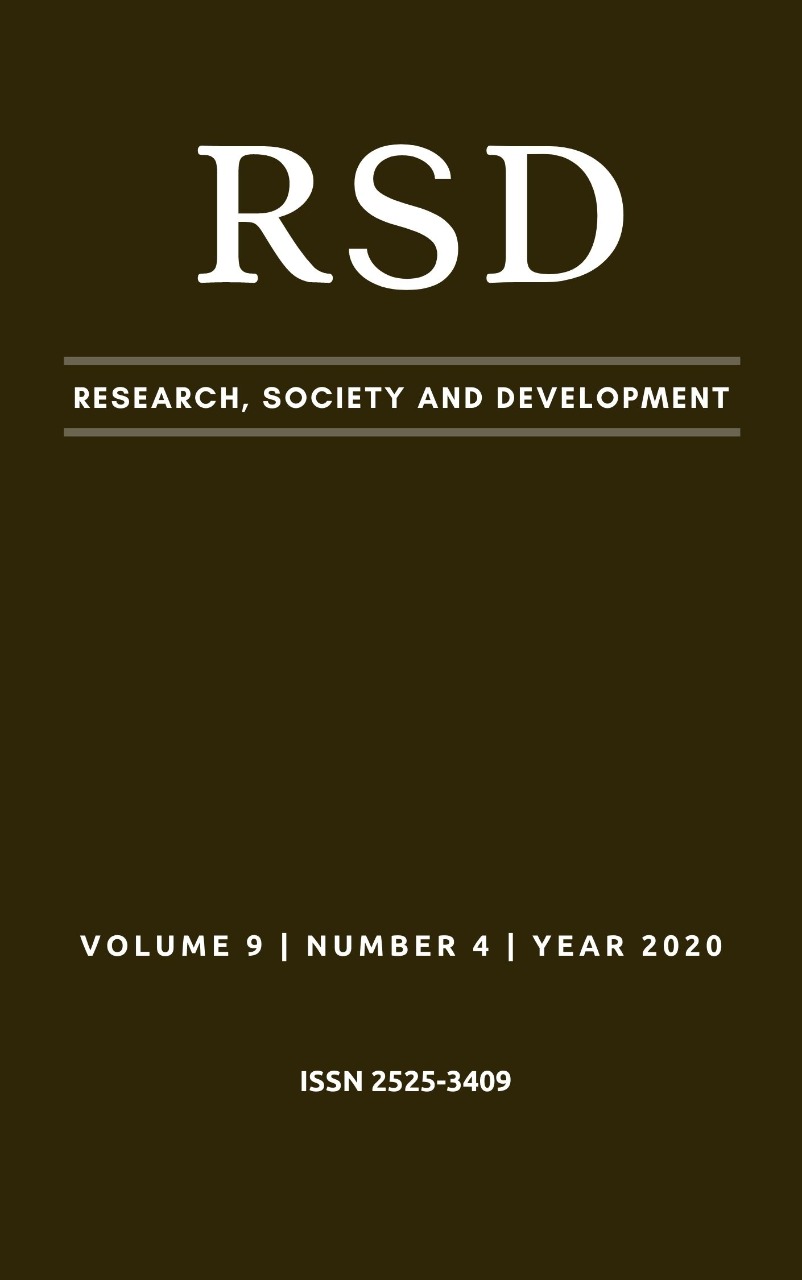Conhecimento de idosos participantes de centros de convivência acerca do hiv/aids
DOI:
https://doi.org/10.33448/rsd-v9i4.2780Palavras-chave:
Conhecimento, Idosos, HIV, Aids.Resumo
Avaliar conhecimento de idosos participantes de centros de convivência acerca do HIV/AIDS. Estudo transversal e analítico, realizado com idosos com idade a partir de 50 anos, participantes de dois centros de convivência localizados no Brasil. A coleta de dados ocorreu em 2017, e utilizou-se um questionário para as variáveis sociodemográficas e o questionário de HIV para Terceira Idade. Associações foram verificadas pelo teste Qui-Quadrado e Exato de Fisher. Participaram 37 pessoas e predominou o sexo feminino. Os domínios conceito, transmissão, prevenção e vulnerabilidade apresentaram avaliação satisfatória na sua totalidade. Em relação ao tratamento, muitos acreditam na cura da doença. Foi identificada associação significativa entre a variável sexo e atividade sexual (p=0,002), variável idade e os domínios conceito (p=0,045), transmissão (p=0,031) e prevenção (p= 0,017). A variável uso de preservativo associou-se ao domínio transmissão (p=0,036), e a variável atividade sexual associou-se aos domínios transmissão (p=0,054) e vulnerabilidade (p=0,034). O conhecimento apresentou-se insatisfatório quanto a transmissão e vulnerabilidade, e satisfatório quanto aos demais domínios do questionário.
Referências
Nardelli, G.G., et al. (2016). Conhecimento sobre síndrome da imunodeficiência humana de idosos de uma unidade de atenção ao idoso. Rev Gaucha Enferm, 37(esp), e2016-0039.
Miranda, G.MD., Mendes, A.C.G., & Silva, A.L.A. (2016). Population aging in Brazil: current and future social challenges and consequences. Rev Bras Geriatr Gerontol, 19(3), 507-519.
Andrade, P.B.S., & Benito, L.A.O. (2016) Perfil da sexualidade de pessoas idosas portadoras de SIDA/AIDS atendidas em um serviço de saúde do Distrito Federal. Universitas: Ciências da Saúde, 14(2), 105-113.
Uchôa, Y.S., et al. (2016). A sexualidade sob o olhar da pessoa idosa. Rev. bras. geriatr. Gerontol,19(6), 939-949.
Brasil. (2017). Ministério da saúde. Boletim Epidemiológico Aids e DST. Acesso em 09 de janeiro de 2020, em: http://www.aids.gob.br/pt-br/pub/2017/boletim-epidemiologico-hivaids-2017.
Lazzaroto, A.R., et al. (2008). O conhecimento de HIV/Aids na terceira idade: estudo epidemiológico no Vale do Sinos, Rio Grande do Sul, Brasil. Cien Saude Colet, 13(6),1833-1840.
Programa Conjunto das Nações Unidas sobre HIV/AIDS. (2014). People aged 50 years and older. Acesso em 14 de janeiro de 2020, https://www.unaids.org/sites/default/files/media_asset/12_Peopleaged50yearsandolder.pdf
Luz, A.C.G., et al. (2015). Sexual behavior in the elderly watched family health strategy. Journal of Research: Fundam Care online, 7(2), 2229-2240.
Malaquias, B.S.S., et al. (2017). Sexuality and knowledge about HIV/Aids in elders who participate in as social center for the elderly. Biosci. J, 33(2),465-475.
Nascimento, R.G., et al. (2013). Nível de conhecimento de idosos comunitários em relação ao HIV/Aids: estudo exploratório na rede básica de saúde de Belém, Pará, Brasil. Revista Brasileira De Ciências Do Envelhecimento Humano, 10(1),113-122.
Cerqueira, M.B. et al. (2016). Idosos de Montes Claros (MG) e HIV/Aids: conhecimentos e percepções. Rev Unimontes Científica, 18(1).
Sousa, L.R.M., et al. (2019). Representações sociais do HIV/Aids por idosos e a interface com a prevenção. Rev. Bras. Enferm, 72(5),1129-1136.
Villarinho, M.V., & Padilha, M.I. (2016). Feelings reported by health workers when facing the Aids epidemic (1986–2006). Texto & Contexto Enferm, 25(1), 1-13.
Maia, D.A.C., et al. (2018). Notificação de casos de HIV/AIDS em idosos no estado do Ceará: série histórica entre os anos de 2005 a 2014. Rev. bras. geriatr. Gerontol, 21(5), 542-552.
Silva, L.C., et al. (2015). Psychosocial impact of HIV/aids diagnosis on elderly persons receiving care from a public healthcare service. Rev Bras de Geriat Gerontol,18(4),821-833.
Brito, N.M.I., et al. (2016). Elderly, sexually transmitted infections and aids: knowledge and risk perception. ABCS Health Sciences, 41(3):140-145.
Cordeiro LI, et al. (2017). Validação de cartilha educativa para prevenção de HIV/Aids em idosos. Rev. Bras. Enferm, 70(4), 775-782.
Monteiro, T.J., et al. (2016). Avaliação do conhecimento sobre HIV/Aids em grupo de idosos através do QHIV3I. Geriatrics, Gerontology and Aging, 10(1), 29-33.
Alencar, R.A. & Ciosak, S.I. (2016). Aids em idosos: motivos que levam ao diagnóstico tardio. Rev Brasileirar Enf, 69(6),1140-1146.
Neves, J.A.C., et al (2015). Processo saúde-doença: a sexualidade e a AIDS na terceira idade. Rev Enfermagem Revista, 18(1):121-135.
Foresto, J.S., et al. (2017). Adesão à terapêutica antirretroviral de pessoas vivendo com HIV/aids em um município do interior paulista. Rev Gaúcha Enferm, 38(1), e63158.
Lousada, N.S.; Borges, S.M., & Rodrigues, E.L. (2017). HIV/Aids na terceira idade: avaliação do conhecimento e percepção de risco no município de Santos. Unisanta Health Science, 1(1), 44-62.
Moura, D.S.; Pessôa, R.M.C., & Almeida, M.M. (2017). Sexuality in the elderly: a discussion about the measures of prevention of HIV/aids. ReOn Facema, 3(1), 407-415.
Bezerra, V.P., et al (2015). Preventive practices in the elderly and vulnerability to HIV. Rev Gaucha Enferm, 36(4), 70-76.
Downloads
Publicado
Edição
Seção
Licença
Autores que publicam nesta revista concordam com os seguintes termos:
1) Autores mantém os direitos autorais e concedem à revista o direito de primeira publicação, com o trabalho simultaneamente licenciado sob a Licença Creative Commons Attribution que permite o compartilhamento do trabalho com reconhecimento da autoria e publicação inicial nesta revista.
2) Autores têm autorização para assumir contratos adicionais separadamente, para distribuição não-exclusiva da versão do trabalho publicada nesta revista (ex.: publicar em repositório institucional ou como capítulo de livro), com reconhecimento de autoria e publicação inicial nesta revista.
3) Autores têm permissão e são estimulados a publicar e distribuir seu trabalho online (ex.: em repositórios institucionais ou na sua página pessoal) a qualquer ponto antes ou durante o processo editorial, já que isso pode gerar alterações produtivas, bem como aumentar o impacto e a citação do trabalho publicado.


